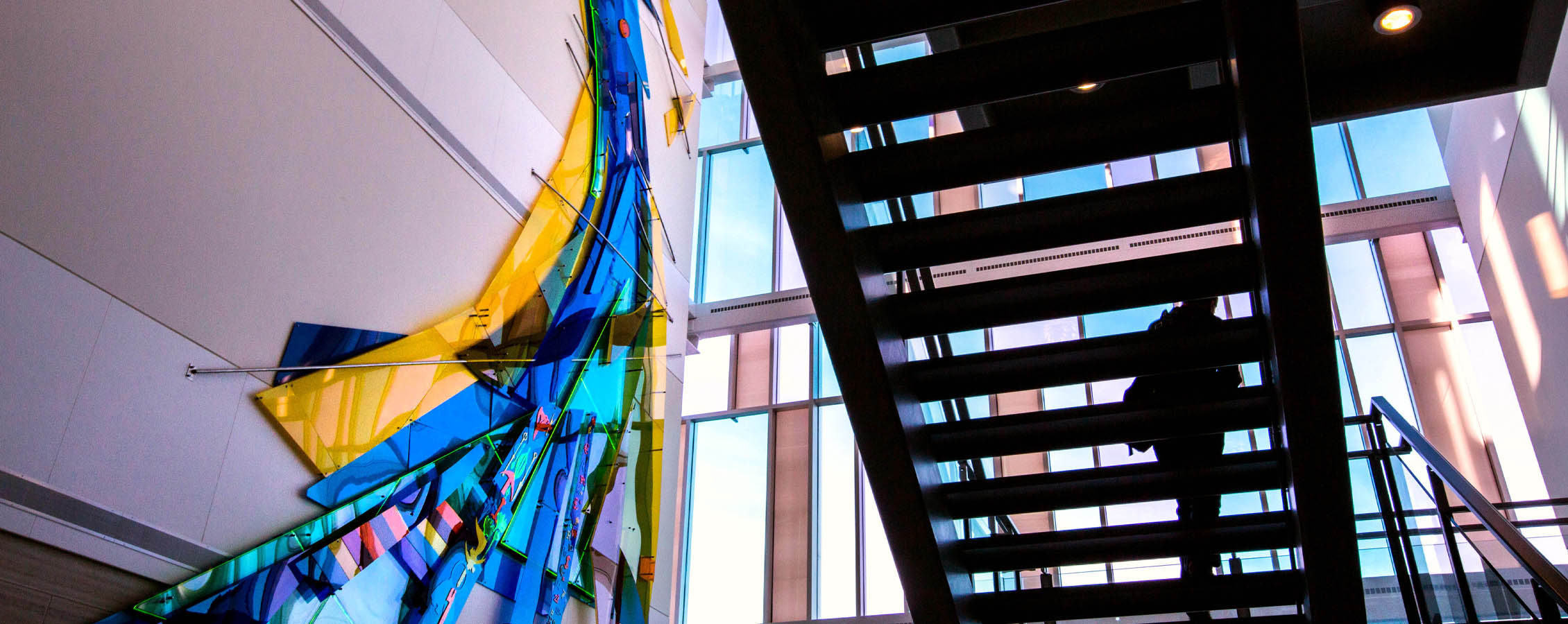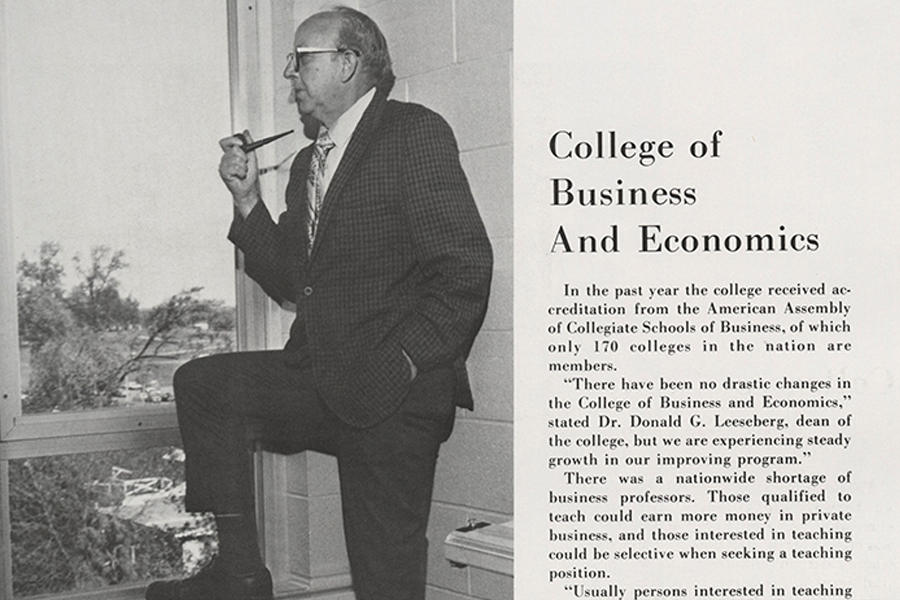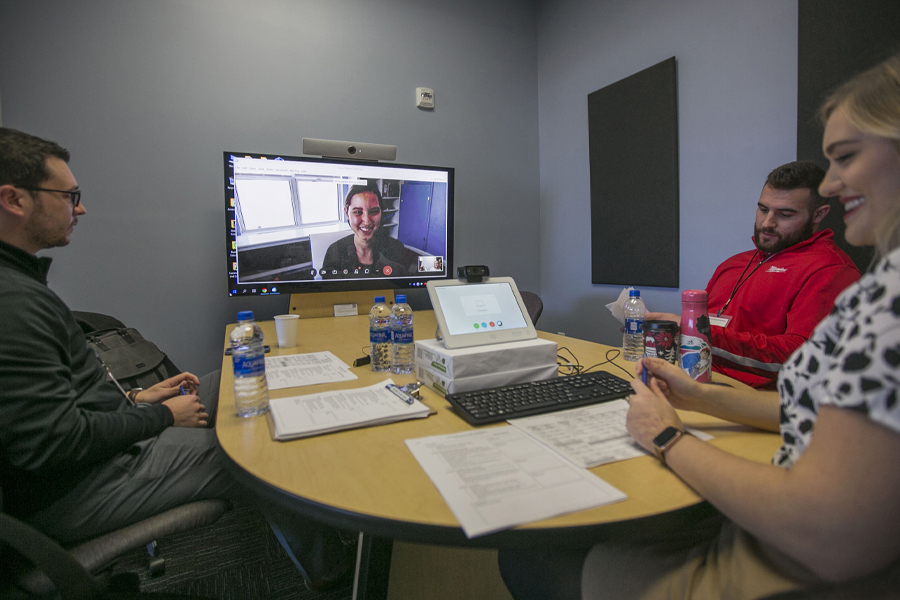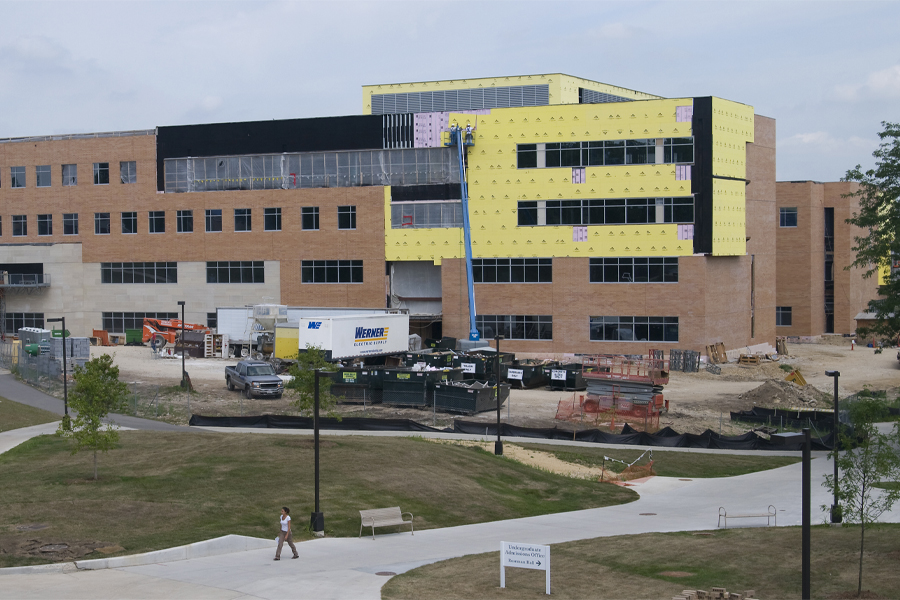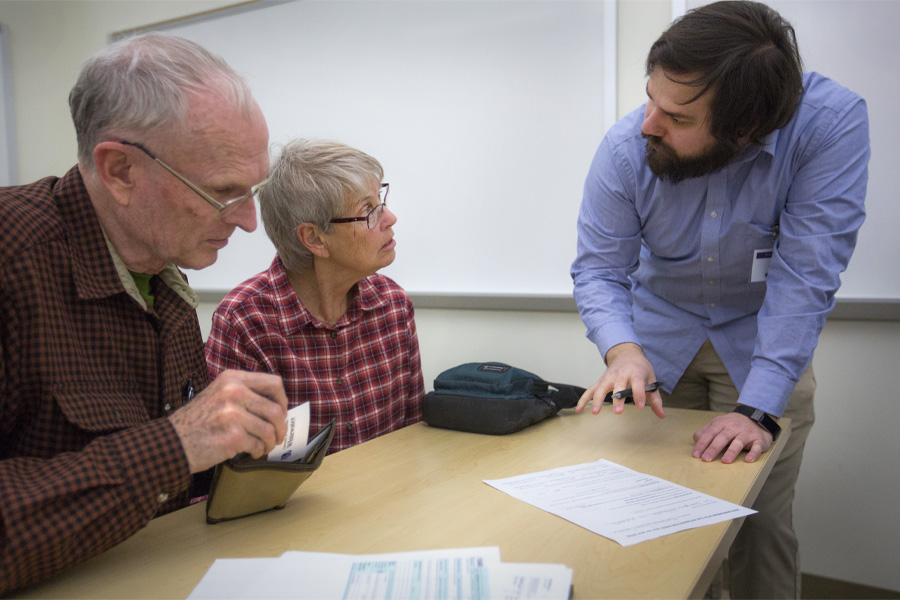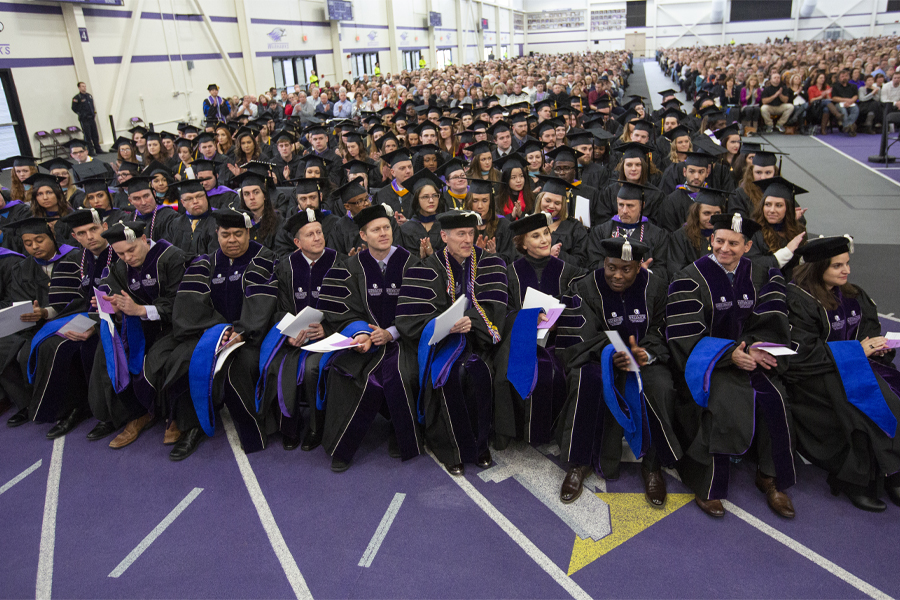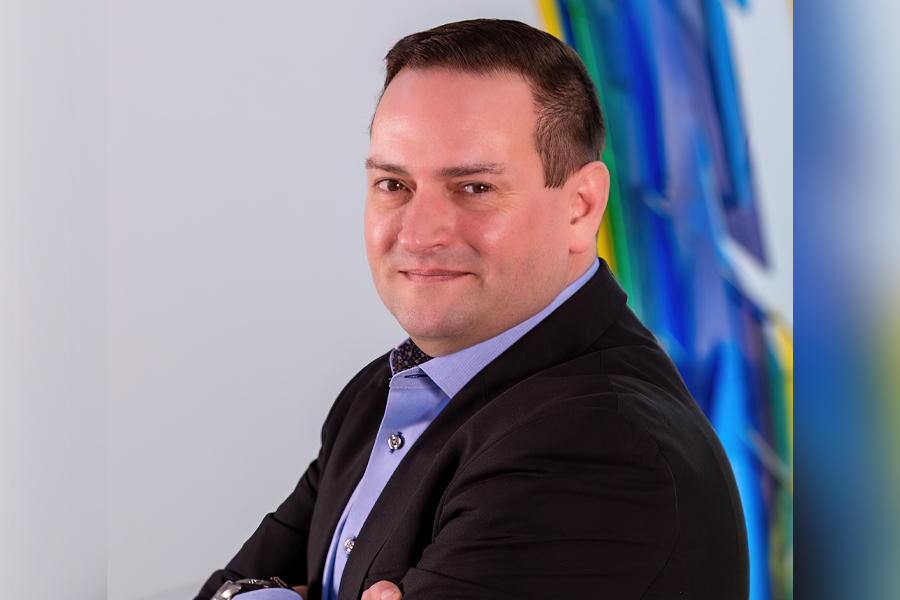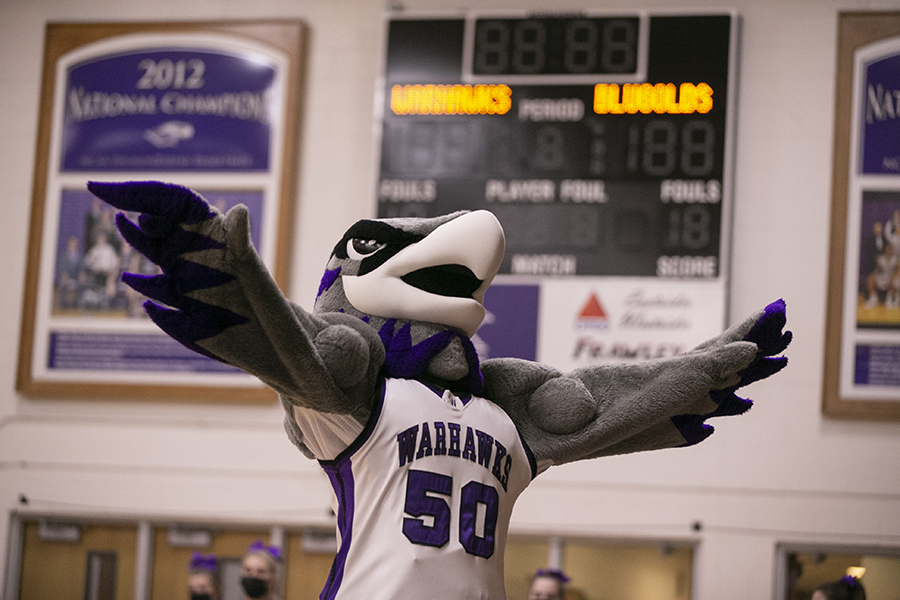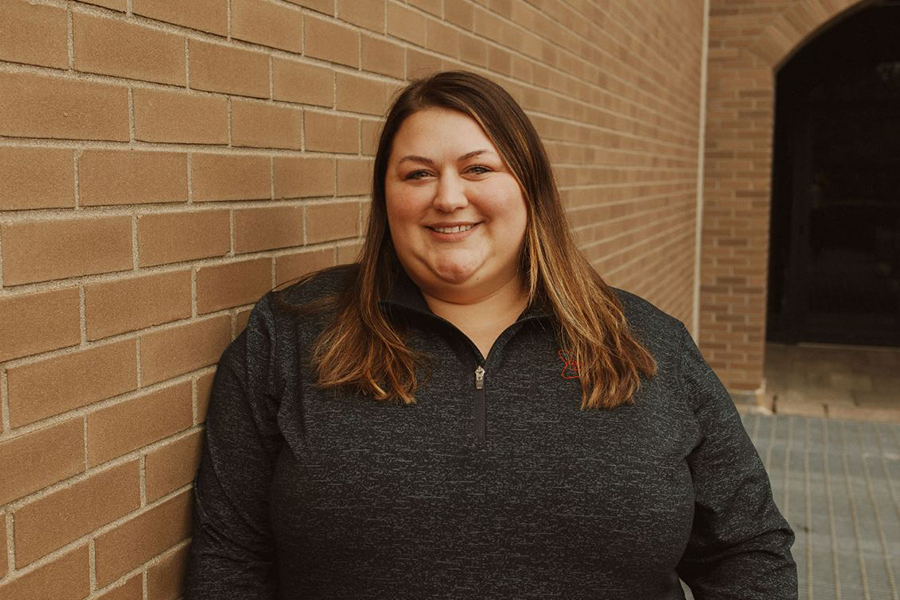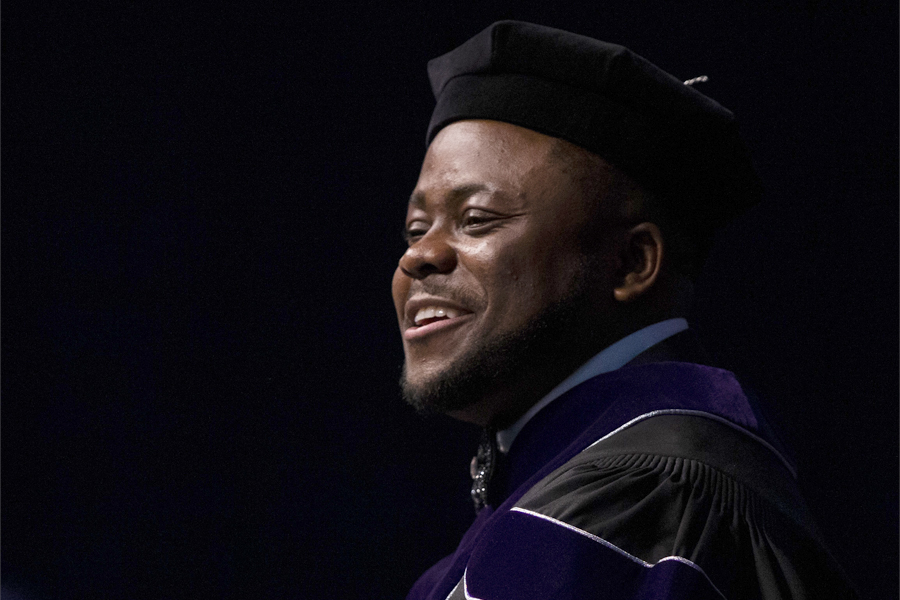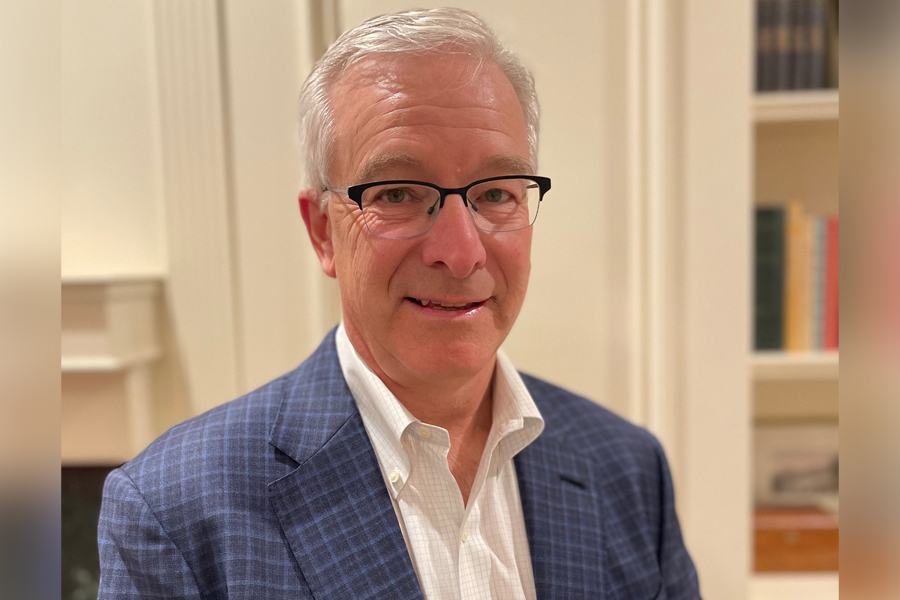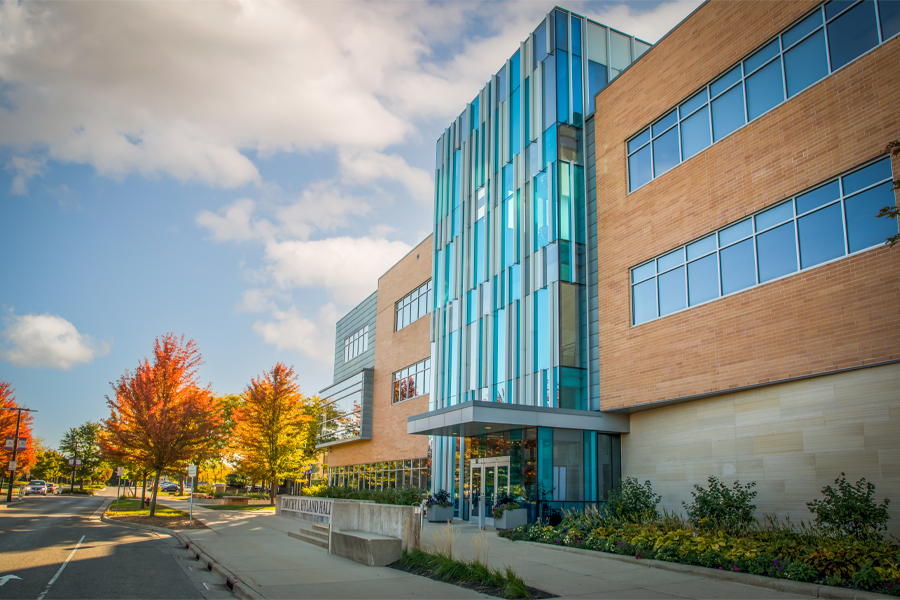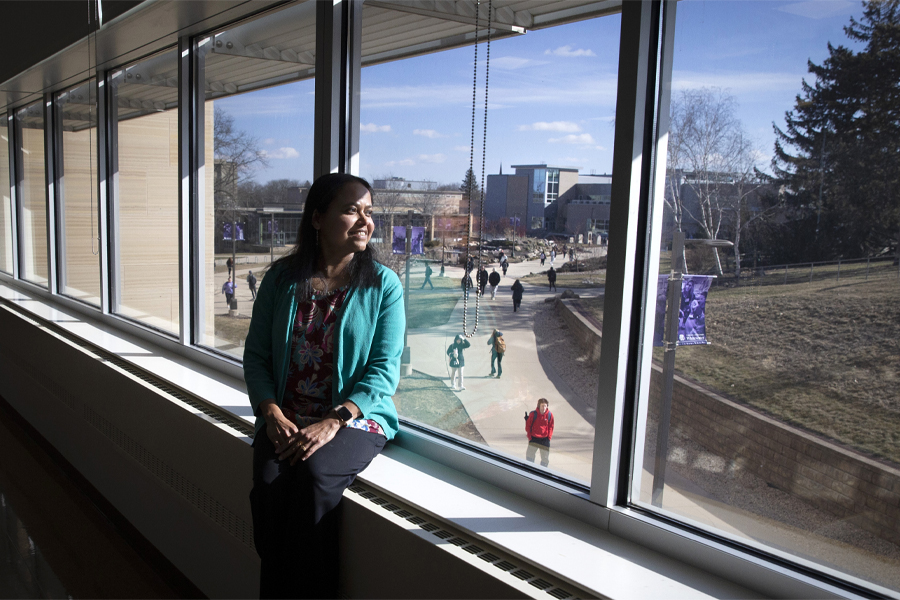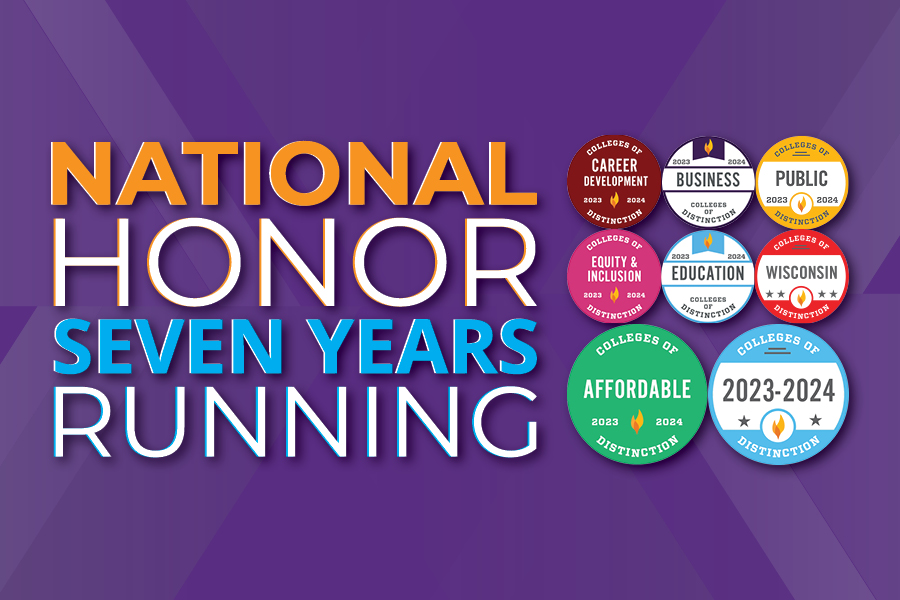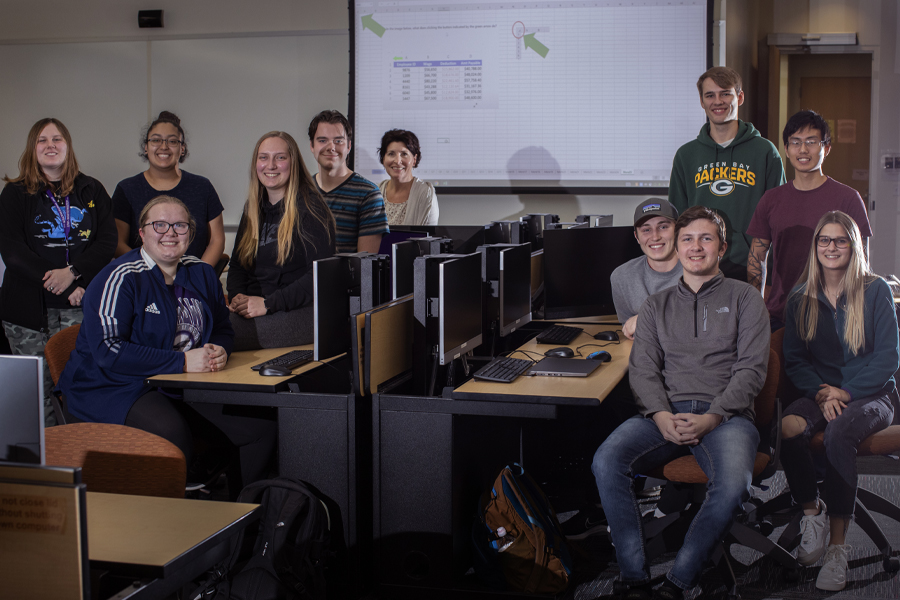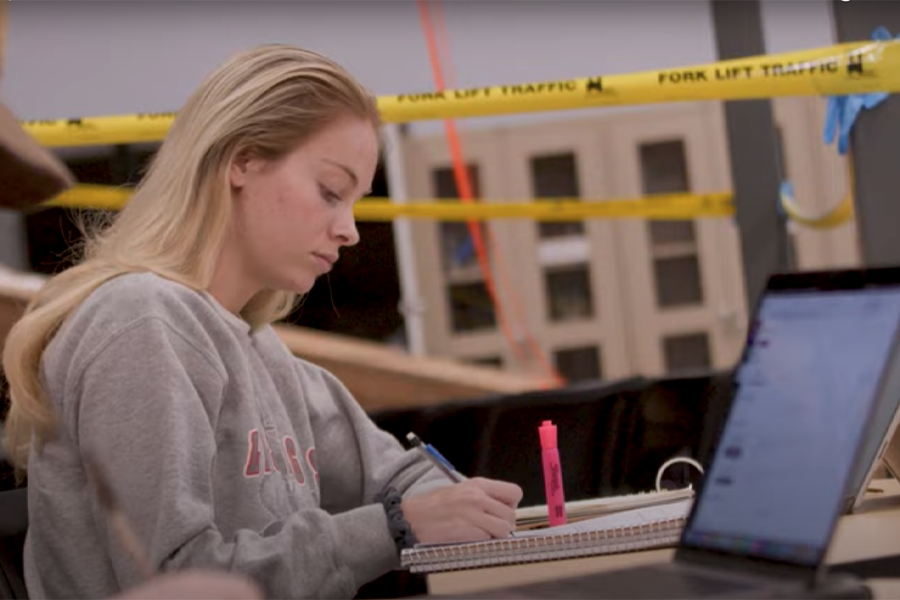UW-Whitewater’s College of Business and Economics celebrates 110th anniversary
February 14, 2024
Written by Chris Lindeke | Photos by Craig Schreiner, courtesy of the UW-Whitewater Archives and Area Research Center, and submitted
Select the links below to navigate directly to a given section or keep scrolling to read the story from the beginning.
The University of Wisconsin-Whitewater’s College of Business and Economics, the state’s largest business school, is celebrating 110 years of offering business education and 25 years of offering online courses and degrees during the 2023-24 academic year.
Accredited by the Association to Advance Collegiate Schools of Business, the college is among less than 2 percent of business schools in the world that hold dual accreditation in business and accounting from AACSB.
“We are proud of our College of Business and Economics,” said UW-Whitewater chancellor Corey A. King. “For more than a century, business education has been a source of pride for our campus. The college’s reputation for excellence is founded on exceptional student experiences, and it delivers relevant and rigorous curriculum that is conveyed through innovative and effective teaching.
“Thousands of Warhawks are making a difference throughout the world in their professions and communities because of their experience at our business school.”
The college places 99 percent of graduates in jobs or graduate school within six months of graduation. Nearly 90 percent of graduates are employed in Wisconsin and northern Illinois.
“We help create a stronger economy for Wisconsin,” said Paul Ambrose, Dean of the College of Business and Economics. “When students earn a degree in business from UW-Whitewater or UW-Whitewater Online, employers can be sure that they are looking at a quality candidate.”
Ambrose was hired as dean of the college in January 2023. He served in multiple roles within the college since stepping onto campus in 2005 — faculty member, department chair, associate dean and interim dean — before being hired to lead it.
“Dean Ambrose continues to elevate the college, leveraging our expertise and resources to offer the best programs for students with exceptional learning outcomes,” said John Chenoweth, UW-Whitewater’s Provost and Vice Chancellor for Academic Affairs. “The innovative approach of our faculty and staff is helping to meet the needs of the employers we work with. In addition, the college’s recent research and ideation on topics like ethics and sustainability shows its commitment to making a positive impact on our society.”
Getting down to business
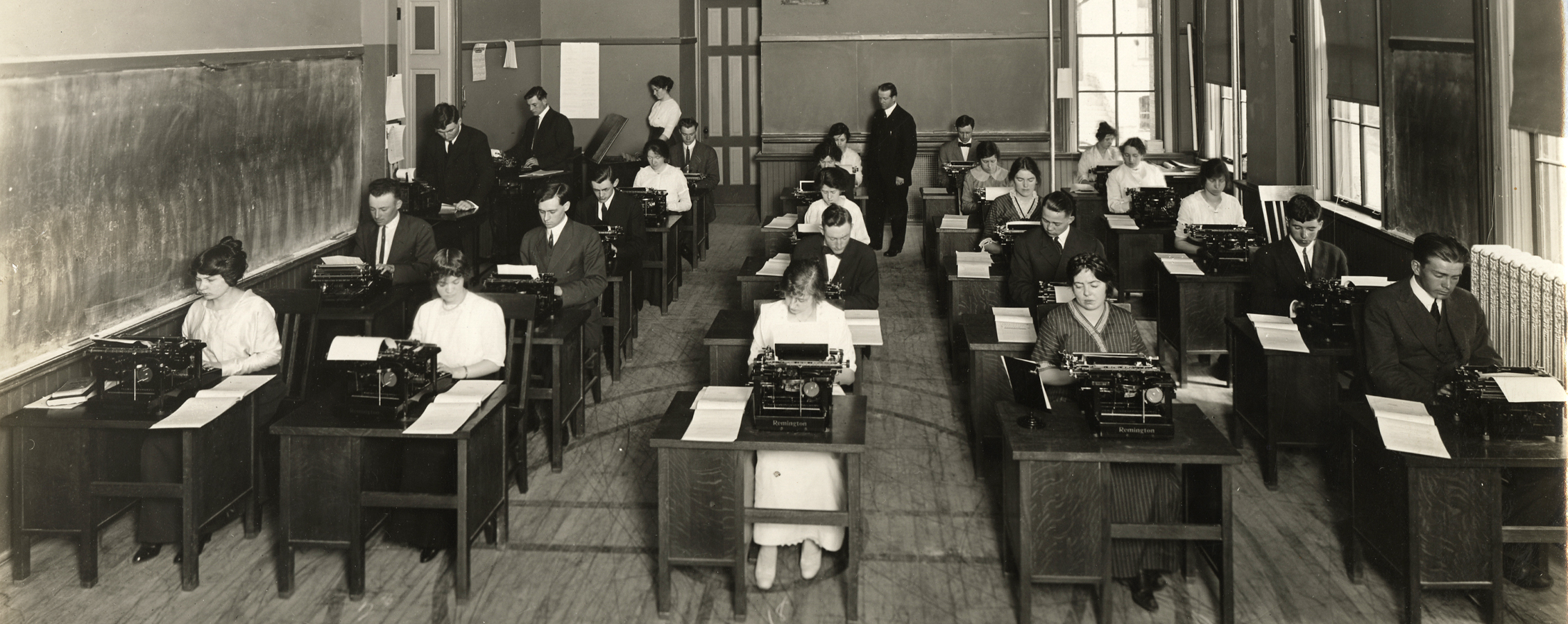
UW-Whitewater business students in the earliest days of the business school. (Photo courtesy of the UW-Whitewater Archives and Area Research Center)
In September of 1913, a total of 37 students enrolled in the university’s business education courses, then known as commercial education. Students learned skills relevant to the times, including bookkeeping. By 1937, a total of 537 business students were enrolled, and a powerhouse business school was born.
The College of Business and Economics was formed in 1964 as it is currently known today.
AACSB accreditation
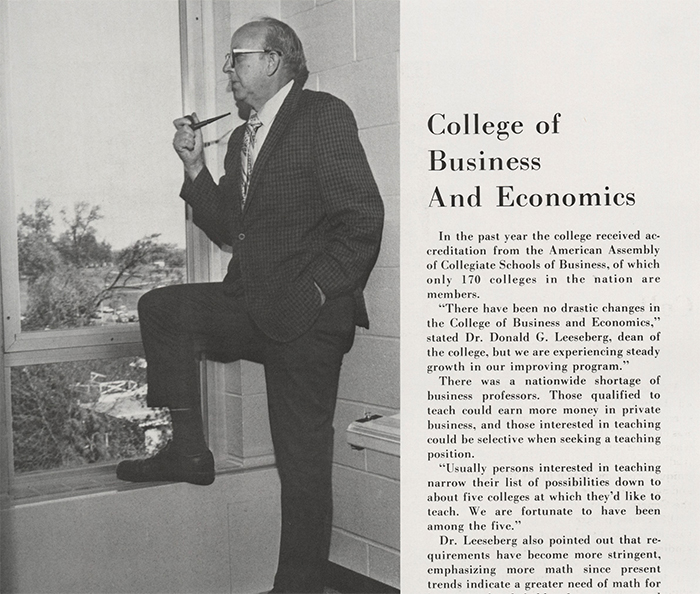
In 1968, the college became a Business Alliance Member with the Association to Advance Collegiate Schools of Business (AACSB), a global nonprofit association that connects educators, students and business to create the next generation of great leaders. UW-Whitewater garnered AACSB accreditation in 1974.
Three years of accreditation procedures prior to the 1974 acceptance included a two-volume, 780-page report compiled by local faculty and a site visit from the AACSB in the months leading up to the approval, according to The Royal Purple. At the time, a total of 2,600 students, including business majors and minors, and 70 faculty members were part of the college, the RP article noted.
In 2021, the college earned AACSB accounting accreditation to secure a spot among the top 2 percent of business schools in the world.
In addition to recognizing UW-Whitewater as a high-quality business school, AACSB accreditation drives improvement — the college continuously refreshes its facilities and technology resources to allow faculty members to deliver academic programs successfully and must submit annual reports to AACSB and undergo formal reviews from the organization.
Pictured is a page from the 1975 edition of the Minneiska, UW-Whitewater’s campus yearbook, highlighting the college and its AACSB accreditation. (Photo courtesy of the UW-Whitewater Archives and Area Research Center)
An early leader in online education
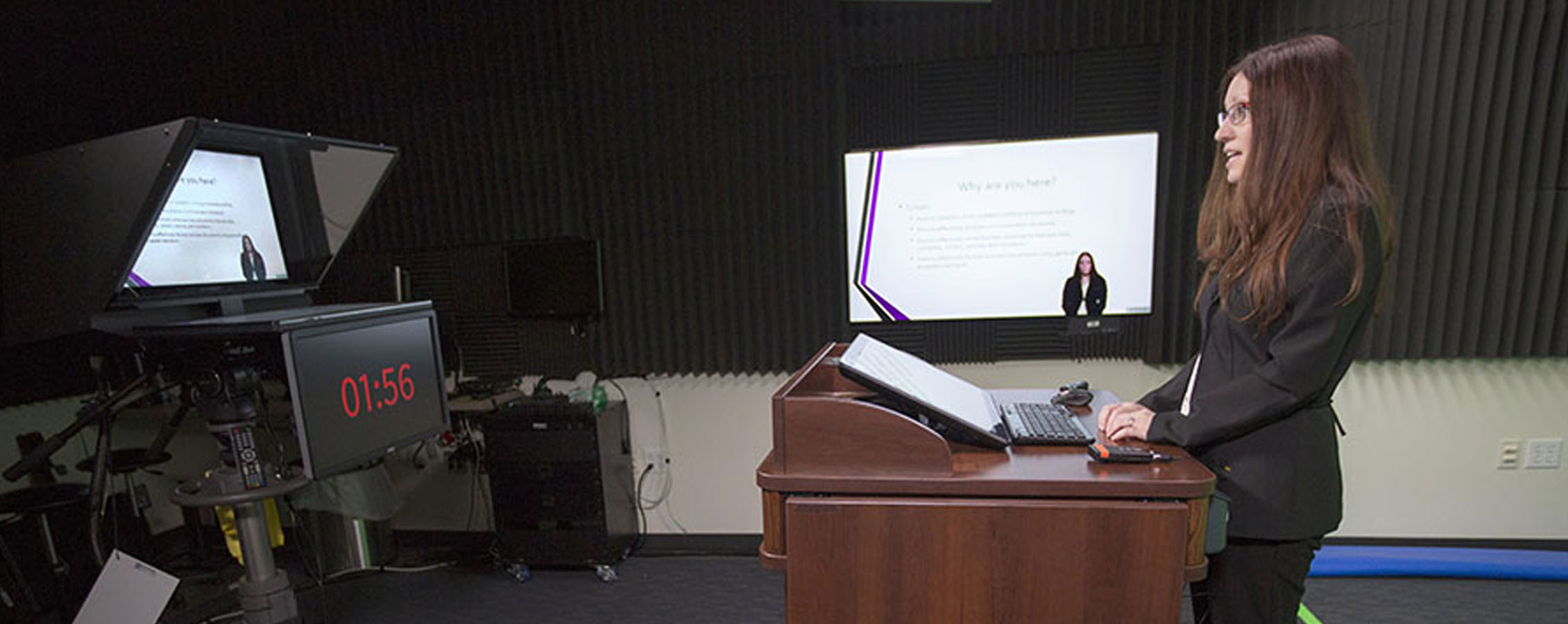
Lecturer of Management Emily Iverson records her opening statements for the spring semester in her online business writing course. Lectures for the course are recorded in a studio at the Online Learning and Technology Center in Hyland Hall on Tuesday, Jan. 14, 2020. (UW-Whitewater photo/Craig Schreiner)
The university launched what would become UW-Whitewater Online in 1998. Today, online programs include 16 undergraduate majors, 15 master’s degrees and 34 certificates. Subjects include business, communication, math and science, liberal studies, political science and special education.
UW-Whitewater ranked No. 1 in Wisconsin of single school, business colleges in the 2024 U.S. News and World Report review of online programs and is home to the state’s top-ranked single school in the following categories:
- Best Online MBA
- Best Online Business Graduate Program
- Best Online Business Undergraduate Program
- Best Online MBA Program for Veterans
- Best Online Business Graduate Program for Veterans
“Business programs offered in the online format are taught by the same faculty and have the same learning outcomes as on-campus programs,” Ambrose said. “We are proud to say that our online degree has the same quality, the same impact, and, in fact, the same diploma as our on-campus programs.”
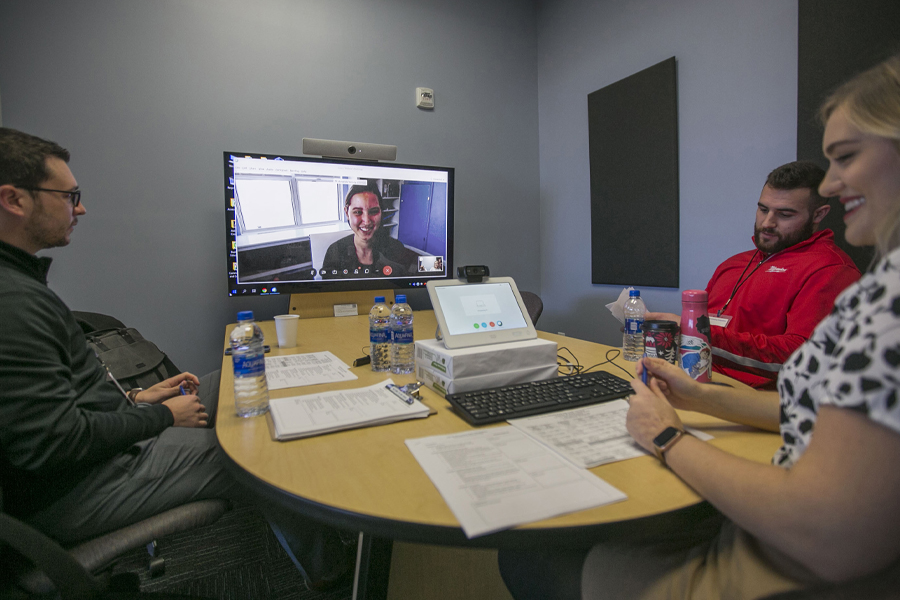
General business major Amanda Yancey, who completed her BBA online, gets acquainted with judges before making her presentation. UW-Whitewater students participated in the second round of the Northwest Mutual Relational Selling Competition, organized by the Institute for Sales Excellence in the College of Business and Economics, on Wednesday, Dec. 4, 2019. (UW-Whitewater photo/Craig Schreiner)
Hyland Hall: Our business home
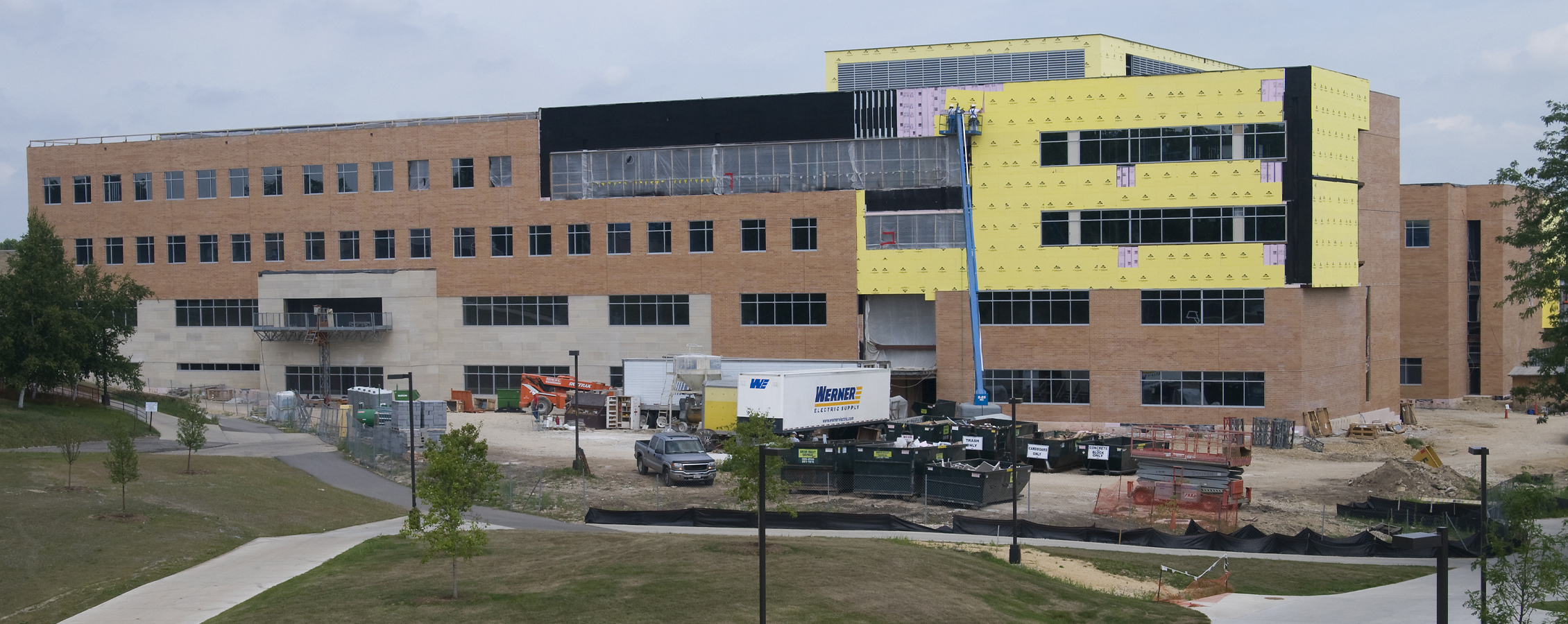
Hyland Hall construction in 2009. (Photo courtesy of the UW-Whitewater Archives and Area Research Center)
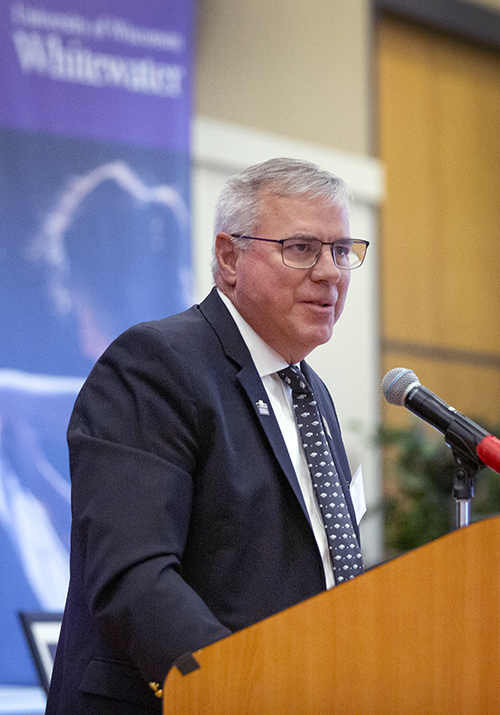
In 2008, Baker Hall, Salisbury Hall and Sayles Hall were demolished to make way for Timothy J. Hyland Hall, which became home to the College of Business and Economics. Constructed in accordance with the Wisconsin Department of Administration Division of State Facilities Sustainable Facilities Standards, Hyland Hall was completed in July 2009. Gifts supported $5.5 million of the $41.5 million total cost.
Timothy J. Hyland, namesake of Hyland Hall, home of the College of Business and Economics, addresses alumni at Founders Day on Saturday, April 22, 2023. (UW-Whitewater photo/Craig Schreiner)
The facility opened to students that September and was dedicated during a grand opening celebration on Oct. 23, 2009. It features an innovation and business development outreach center, an applied investment center that allows real and simulated stock trading, the 400-seat Timmerman Auditorium, and an executive boardroom. The 180,000 square foot building also includes 34 classrooms, 27 student organization offices, 142 faculty offices, five computer labs, seven conference rooms, three lecture halls, four student project rooms and the Deloitte Café.
Hyland, an accounting alumnus and entrepreneur who graduated from UW-Whitewater in 1982, made a significant contribution to the building. He credited much of his professional success to the quality of the education he received at UW-Whitewater. “I felt compelled to express my appreciation by giving back to Whitewater,” he said. “Hopefully UW-Whitewater students will remember their experience here and pay it back when they can.”
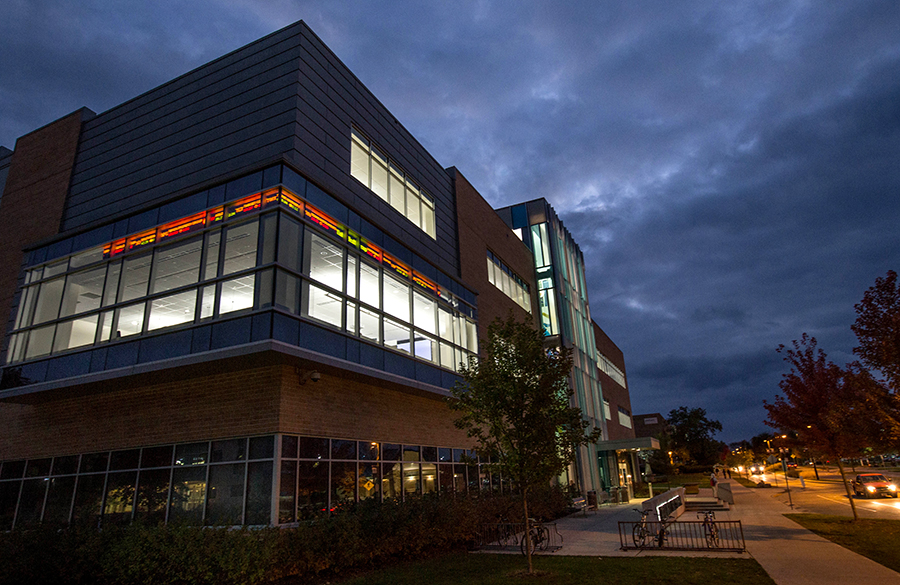
UW-Whitewater’s Hyland Hall at night, with the stock market ticker illuminated over the trading room window. (UW-Whitewater photo/Craig Schreiner)
Exceptional student experiences
Nationally recognized and award-winning student organizations
The College of Business and Economics houses some of the nation’s most successful college student organizations.
American Marketing Association (AMA)

The AMA Regional Marketing Conference returned to Hyland Hall on Friday, Oct. 7, 2022, with students from 28 universities coming to campus to network, hear speakers and compete in sales and marketing competitions. (UW-Whitewater photo/Craig Schreiner)
In April, UW-Whitewater’s AMA chapter was named International Chapter of the Year and Platinum Circle title for the 12th consecutive year. The Warhawks scored 99 out of a possible 100 points based on their professional development activities and competitions, social impact, chapter communications, fundraising, member recruitment, retention and engagement, operations, and the presentation of their program. “UW-Whitewater is unquestionably the most successful program in the history of AMA Collegiate,” said Keith Niedermeier, former president of the AMA Collegiate Chapters Council and professor of marketing at Indiana University. “It is the standard by which all other chapters measure themselves.” The program has now won International Chapter of the Year 20 times in 45 years.
Read more about American Marketing Association »
Enactus
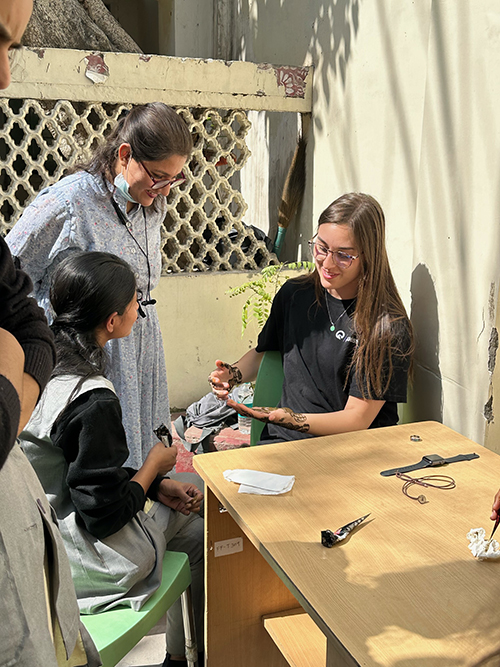
In 2021, UW-Whitewater’s Enactus team, which seeks to apply business principles to do good, won the Enactus United States National Exposition with their business model for the Aayda Initiative to expand eye care, reduce preventable vision loss, and provide women with valuable training, employment and income in remote regions of low-income countries. The group collaborated with Combat Blindness International (CBI) and its partners in India to help thousands of people with restored vision and to empower the young women who work as vision screeners. UW-Whitewater became the first Wisconsin institution to win a national Enactus championship and represent the United States at the Enactus World Cup 2021 competition. In December, CBI and Dr. Shroff’s Charity Eye Hospital celebrated a milestone achievement of 1 million door-to-door vision screenings by Aayda screeners.
During a break between meetings, UW-Whitewater entrepreneurship major Lydia Coatney receives a henna tattoo from a vision screener in training at the Dr. Schroff’s Charity Eye Hospital in Delhi. Called mehndi, this ancient art symbolizes good health and prosperity. Training screeners is part of the UW-Whitewater Chapter project created to empower impoverished women and mitigate preventable blindness. The young women travel to rural villages and provide free vision screenings throughout northern India under the direction of the Dr. Schroff’s Charity Eye Hospital in Delhi. To date, the group has screened hundreds of thousands of people. (Submitted photo/courtesy Enactus)
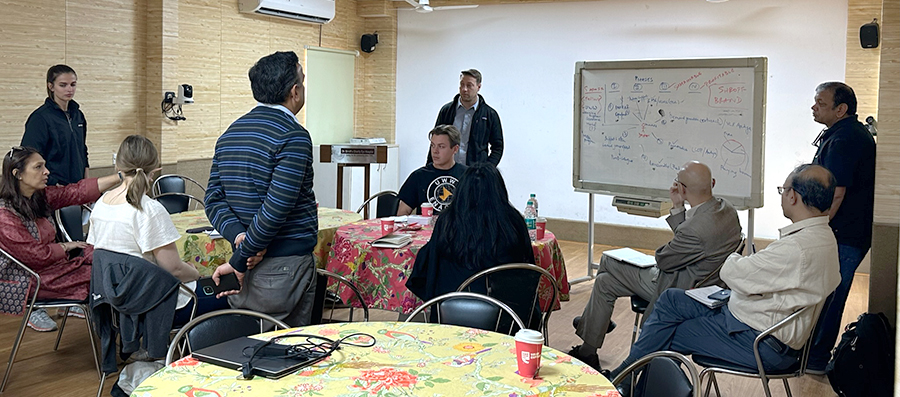
Enactus students participate in a planning session at Dr. Schroff’s Charity Eye Hospital in Delhi. Training screeners is part of the UW-Whitewater Chapter project created to empower impoverished women and mitigate preventable blindness. The young women travel to rural villages and provide free vision screenings throughout northern India under the direction of the Dr. Schroff’s Charity Eye Hospital in Delhi. To date, the group has screened hundreds of thousands of people. (Submitted photo/courtesy Enactus)
DECA
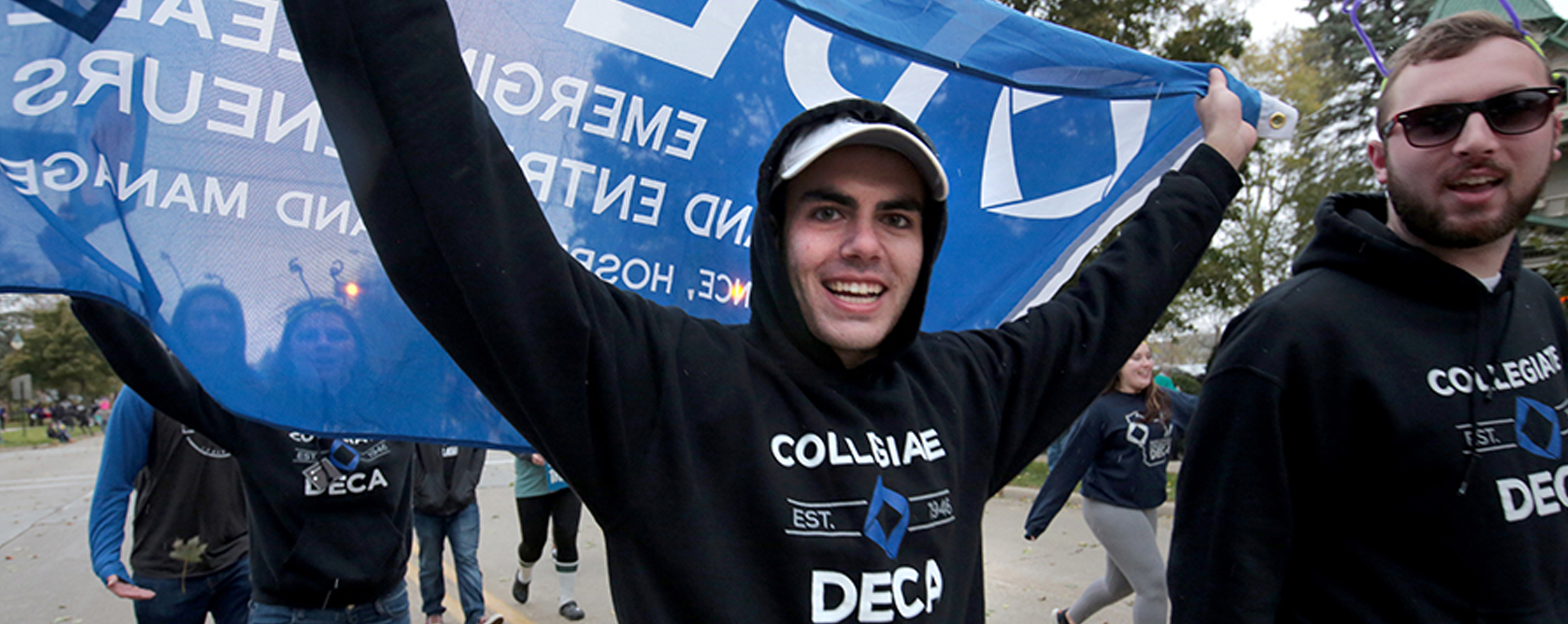
Student organizations including DECA walk the parade route showing their spirit during the UW-Whitewater Homecoming Parade on Saturday, Oct. 20, 2018. (UW-Whitewater photo/Craig Schreiner)
UW-Whitewater’s Collegiate DECA, which prepares emerging leaders and entrepreneurs for careers in marketing, finance, hospitality and management, is annually recognized as one of the top groups in the nation. Last spring, UW-Whitewater was recognized as the fifth-largest Collegiate DECA chapter in the world and was one of 22 schools across the organization to receive a Collegiate DECA Chapter Leadership Passport Award for building the personal and professional skills of its members. The Warhawks claimed 74 individual and chapter honors — the most of any school that attended the 2023 International Career Development Conference.
Collegiate Entrepreneurs Organization
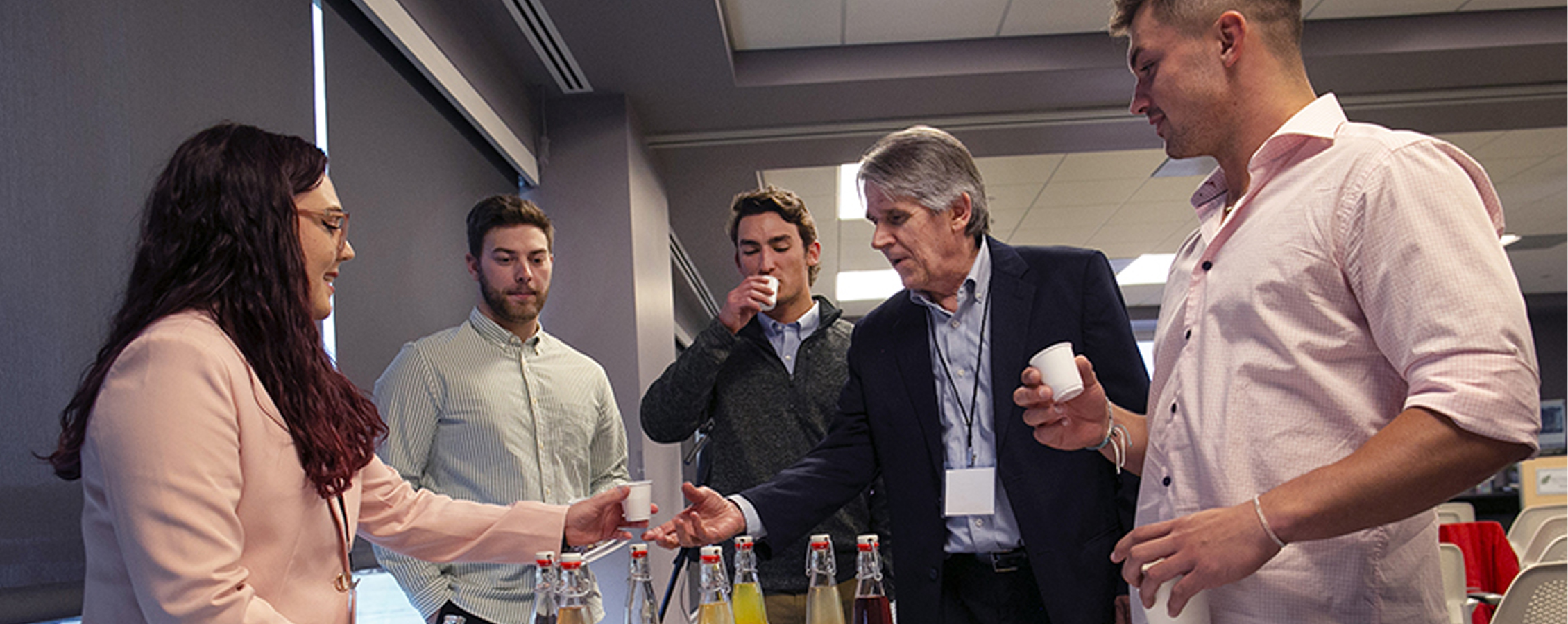
Entrepreneurship major Kara Zamora of Kara’s Kombucha, left, offered a sample of her kombucha to William Dougan, professor of management, at the Warhawk Business Plan Competition at the Whitewater Innovation Center on Wednesday, April 27, 2022. The event was organized by the Collegiate Entrepreneurs’ Organization (CEO). (UW-Whitewater photo/Craig Schreiner)
UW-Whitewater’s Collegiate Entrepreneurs Organization (CEO) chapter supports entrepreneurship students through networking, guest speakers, workshops and competition. The group annually attends the CEO National Conference and supports competitions in partnership with the Whitewater University Innovation Center, including Launch Pad, the Warhawk Elevator Pitch Competition and the Warhawk Business Plan Competition.
Read more about Collegiate Entrepreneurs Organization »
An accounting powerhouse
The accounting program was known as bookkeeping, one of four original courses in the business curriculum, when it was first offered in 1913. The program has blossomed under the guidance of world-renowned faculty and driven students — accounting has consistently ranked among the top three majors of students enrolled at UW-Whitewater.
By 1998, UW-Whitewater ranked No. 1 in the nation in the percentage of students achieving first-time pass rates on the Uniform Certified Public Accountant Examination (CPA).
“The program goes further than helping you pass the CPA exam, but the results were undeniable,” said John Buckley, a 1982 graduate in accounting and current UW-Whitewater Foundation Board member. “I passed on my first try, but that was not uncommon. That’s not normal on a regular campus. We always prided ourselves on the first-time pass rate.”
UW-Whitewater consistently places 100 percent of its accounting graduates in full-time jobs or graduate school according to student survey responses.
Renee Kraft, senior manager for planning and forecasting at Molson Coors, earned a BBA in accounting in 2012 and was involved in Beta Alpha Psi, a professional development organization for accounting and finance majors. She enjoyed the curriculum offered by the college beyond just her accounting courses.
“You get a more well-rounded business experience,” Kraft said. “I liked the fact that I was able to take economics and different finance and general business courses.”
Kraft also earned a Master of Professional Accountancy (MPA) in 2013 from UW-Whitewater.
“The MPA provided me with enhanced knowledge of accounting policies and procedures — we had to do case studies that I wouldn’t have seen as an undergrad,” Kraft said. “There are so many soft skills I learned even on top of the normal accounting policies and procedures.”
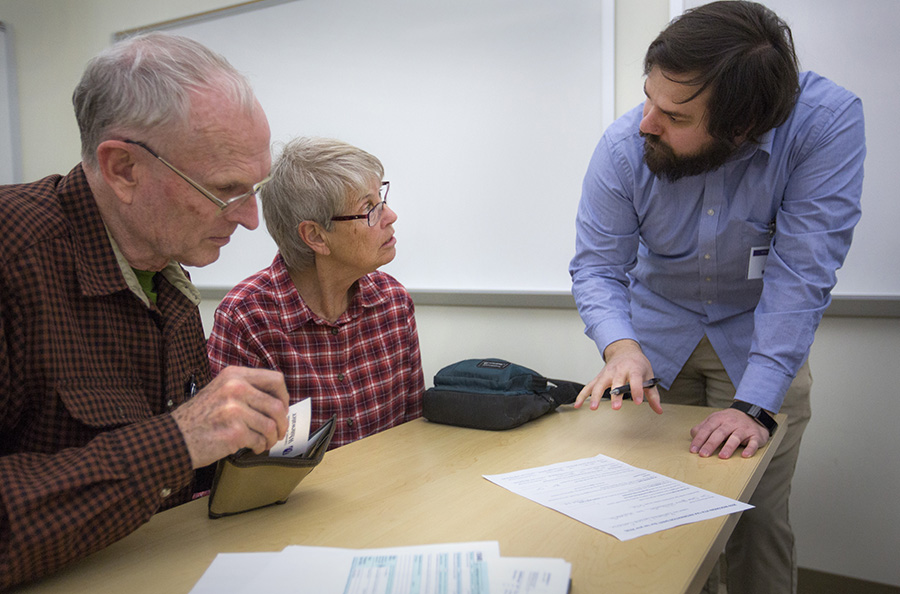
Whitewater community members Jerome and Barbara Converse receive information on their tax return from a volunteer preparer, UW-Whitewater accounting major Jose Pincheira, at Hyland Hall on Wednesday, Feb. 20, 2019. (UW-Whitewater photo/Craig Schreiner)
The program’s reach also extends to have a positive impact in the community. Last year, 24 students participated in Volunteer Income Tax Assistance (VITA), which offers free tax preparation and electronic filing of federal and state income tax returns to qualifying taxpayers. The VITA clinic is staffed by certified student preparers and supervised by accounting faculty. In 2023, VITA staff prepared more than 200 tax return packages, earning their clients more than $300,000 in refunds.
Alan Braatz, who graduated with a BBA in accounting in 2023, enjoyed his experience working in the VITA program.
"I got hands-on experience preparing real tax returns," said Braatz, who currently works as a staff accountant at Wipfli in Appleton. "Giving students opportunities to apply what they’ve learned in the classroom to actual work helps them have a seamless transition into the professional world."
Doctor of Business Administration
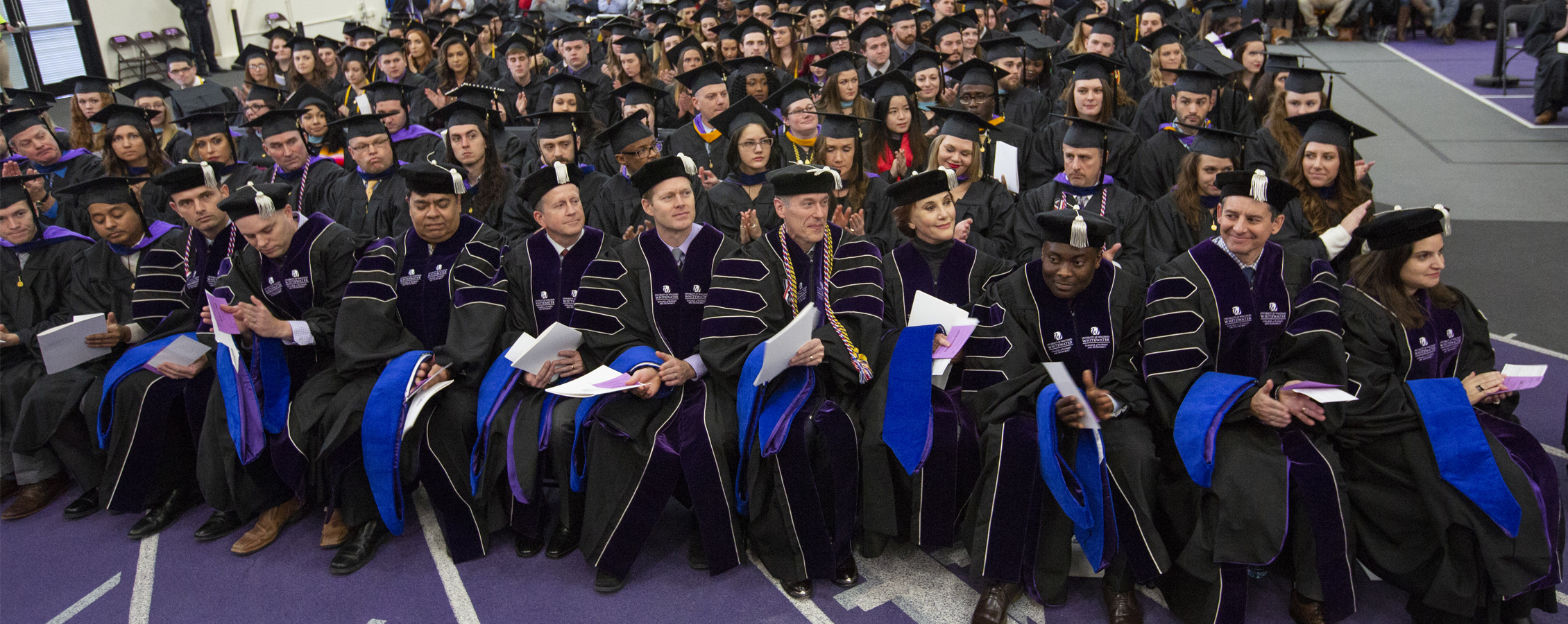
Brian Huels, sixth from right, and members of the first cohort of Doctor of Business Administration graduates at UW-Whitewater sit in the front row at commencement, waiting to receive their degrees on Dec. 16, 2017, in Kachel Fieldhouse on campus. Huels is an associate professor of accounting at UW-Whitewater. (UW-Whitewater photo/Craig Schreiner)
UW-Whitewater is Wisconsin’s only AACSB accredited university to offer a Doctor of Business Administration (DBA). The degree program was approved by the Universities of Wisconsin Board of Regents in 2013, and the first DBA graduate walked across the stage in 2017.
The DBA is a practitioner-oriented degree with a curriculum focused on integrating business functions such as accounting, finance, management, marketing, and information technology. The degree is applied and will help students solve real-world business problems.
“Our DBA is an outstanding opportunity for people who either can’t or don’t want to quit working, but want to expand their problem-solving and data analysis skills and gain a doctoral degree to set them apart,” Christine Clements, dean from 2001-14, said at the time of approval.
Patrice Achu, who earned his DBA in December 2023 after previously earning a BBA in accounting (2010) and an MBA (2020) from UW-Whitewater, said the doctorate program exceeded his expectations and challenged him to improve his data analysis and research skills.
“It’s a very, very rigorous program,” Achu said. “When you’re working on your thesis, it’s important to be able to sort through data and make sure the data makes sense and represents what you’re trying to accomplish. That’s transferable in the workplace.”
Achu is currently based in Buffalo, New York, as the controller for Kerry Group, a public food company headquartered in Ireland. He served as the winter commencement student speaker in December. Achu and Eric Barber are the only Warhawks in the university’s history to earn a DBA and two other degrees from UW-Whitewater.
Preparing current and future business professionals
The college today
More than 3,700 undergraduates and 1,000 graduate students currently reside in the college, which houses 14 majors, 20 minors for non-business majors, 12 minors for business majors and eight certificates. This makes it the largest business school in the state and accounts for approximately 40 percent of UW-Whitewater’s enrollment. Finance, marketing, accounting, general business and management are six of the top ten most popular undergraduate majors at the university, while business administration is the most popular master’s degree program.
The college consistently engages the community to enhance networking opportunities for students, faculty, staff, and business leaders. Examples of this outreach include:
Jaelyne White, an entrepreneurship major from Poynette, is a first-generation college student. White is a member of UW-Whitewater’s College Entrepreneurs Organization (CEO) who won first place in the Warhawk Business Plan Competition for her business, Segunda Skin, last spring. She shared her story with the Universities of Wisconsin this fall and was recognized by the UW-Whitewater Foundation Board and Universities of Wisconsin staff members at an event in November. (Universities of Wisconsin video)
- The Whitewater University Innovation Center, which opened in 2011 and serves as a community for entrepreneurs. A collaboration with the City of Whitewater and the Whitewater Community Development Authority, the Innovation Center provides work space, coaching and programming for entrepreneurs representing more than 25 companies.
- The Women in Business Institute (WIBI), which supports current high school and college female students in their pursuit of business education, helps all business students understand the importance of change in the workplace, and enlists community members and alumni involvement. Making its debut last fall, the organization has hosted six events thus far with three more scheduled for the Spring 2024 semester, including a Women in Entrepreneurship panel, a Women in Business Day, a speed networking event and a negotiations workshop.

